Brief Bio:

Louise Erdrich (born June 7, 1954) is a highly regarded American author known for her poignant exploration of Native American culture, identity, and history in her novels, poetry, and children’s books. Born in Little Falls, Minnesota, she is of mixed German and Native American descent, with ancestry from the Turtle Mountain Band of Chippewa Indians, a tribe of the Anishinaabe peoples.
Growing up in North Dakota, Erdrich developed a deep connection to her Native American heritage, which greatly influenced her writing. Her literary career began with the publication of her first novel, “Love Medicine,” in 1984. The novel, which explores the lives of several interconnected families on a Native American reservation in North Dakota, received critical acclaim and won the National Book Critics Circle Award.
Since then, Erdrich has published numerous novels, short stories, and poetry collections, many of which center on themes of family, community, spirituality, and the enduring legacy of colonization on Native American peoples. Her works are celebrated for their lyrical prose, rich characterization, and profound insight into the complexities of human experience. Erdrich continues to write and publish prolifically, using her platform to amplify Native American voices and raise awareness of issues affecting Indigenous communities in the United States.
Available Works in the Colorado Book Club Resource
The Book Club Resource has 8+ copies of each title available for 8 weeks at a time to reading groups across the state. The descriptions below were taken from Amazon.com.
The Antelope Wife (1998) / Discussion Questions

Past and present combine in a contemporary tale of love and betrayal influenced by Chippewa tradition, myth and legend. ‘Everything is all knotted up in a tangle. Pull one string of this family and the whole web will tremble.’ Rozin and Richard, living in Minneapolis with their two young daughters, seem a long way from the traditions of their Native American ancestors. But when one of their acquaintances kidnaps a strange and silent young woman from a Native American camp and brings her back to live with him as his wife, the connections they all hold to the past rear up to confront them. Soon the patterns of their ancestors begin to repeat themselves with truly tragic consequences. No one is better placed than Louise Erdrich to chronicle the Native American experience, and in ‘The Antelope Wife,, she has created an utterly compelling portrait of three generations of one family, who are more closely linked than they could ever imagine. Shrouded in myth and steeped in imagery, this is also a tale of heartbreaking realism which manages to retain a warm and irrepressible humor and belief in the resilience of the human spirit.
The Round House (2012) / Discussion Questions
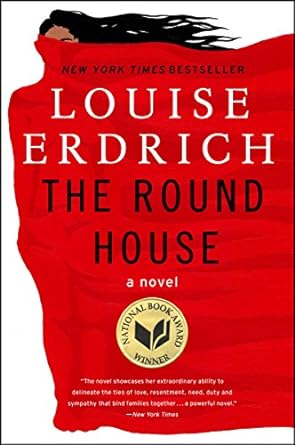
One Sunday in the spring of 1988, a woman living on a reservation in North Dakota is attacked. The details of the crime are slow to surface because Geraldine Coutts is traumatized and reluctant to relive or reveal what happened, either to the police or to her husband, Bazil, and thirteen-year-old son, Joe. In one day, Joe’s life is irrevocably transformed. He tries to heal his mother, but she will not leave her bed and slips into an abyss of solitude. Increasingly alone, Joe finds himself thrust prematurely into an adult world for which he is ill prepared.
While his father, a tribal judge, endeavors to wrest justice from a situation that defies his efforts, Joe becomes frustrated with the official investigation and sets out with his trusted friends, Cappy, Zack, and Angus, to get some answers of his own. Their quest takes them first to the Round House, a sacred space and place of worship for the Ojibwe. And this is only the beginning.
LaRose (2016) / Discussion Questions
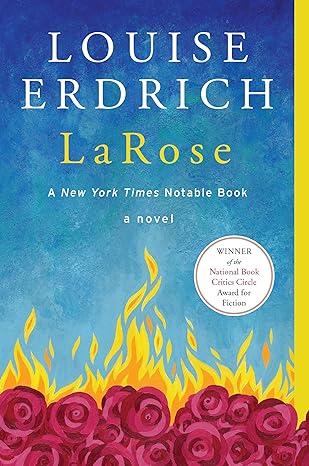
North Dakota, late summer, 1999. Landreaux Iron stalks a deer along the edge of the property bordering his own. He shoots with easy confidence—but when the buck springs away, Landreaux realizes he’s hit something else, a blur he saw as he squeezed the trigger. When he staggers closer, he realizes he has killed his neighbor’s five-year-old son, Dusty Ravich.
The youngest child of his friend and neighbor, Peter Ravich, Dusty was best friends with Landreaux’s five-year-old son, LaRose. The two families have always been close, sharing food, clothing, and rides into town; their children played together despite going to different schools; and Landreaux’s wife, Emmaline, is half sister to Dusty’s mother, Nola. Horrified at what he’s done, the recovered alcoholic turns to an Ojibwe tribe tradition—the sweat lodge—for guidance, and finds a way forward. Following an ancient means of retribution, he and Emmaline will give LaRose to the grieving Peter and Nola. “Our son will be your son now,” they tell them.
LaRose is quickly absorbed into his new family. Plagued by thoughts of suicide, Nola dotes on him, keeping her darkness at bay. His fierce, rebellious new “sister,” Maggie, welcomes him as a coconspirator who can ease her volatile mother’s terrifying moods. Gradually he’s allowed shared visits with his birth family, whose sorrow mirrors the Raviches’ own. As the years pass, LaRose becomes the linchpin linking the Irons and the Raviches, and eventually their mutual pain begins to heal.
But when a vengeful man with a long-standing grudge against Landreaux begins raising trouble, hurling accusations of a cover-up the day Dusty died, he threatens the tenuous peace that has kept these two fragile families whole.
Future Home of the Living God (2017) / Discussion Questions
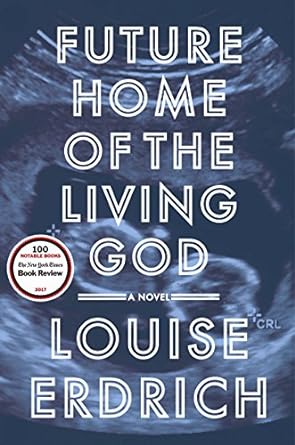
The world as we know it is ending. Evolution has reversed itself, affecting every living creature on earth. Science cannot stop the world from running backwards, as woman after woman gives birth to infants that appear to be primitive species of humans. Twenty-six-year-old Cedar Hawk Songmaker, adopted daughter of a pair of big-hearted, open-minded Minneapolis liberals, is as disturbed and uncertain as the rest of America around her. But for Cedar, this change is profound and deeply personal. She is four months pregnant.
Though she wants to tell the adoptive parents who raised her from infancy, Cedar first feels compelled to find her birth mother, Mary Potts, an Ojibwe living on the reservation, to understand both her and her baby’s origins. As Cedar goes back to her own biological beginnings, society around her begins to disintegrate, fueled by a swelling panic about the end of humanity.
There are rumors of martial law, of Congress confining pregnant women. Of a registry, and rewards for those who turn these wanted women in. Flickering through the chaos are signs of increasing repression: a shaken Cedar witnesses a family wrenched apart when police violently drag a mother from her husband and child in a parking lot. The streets of her neighborhood have been renamed with Bible verses. A stranger answers the phone when she calls her adoptive parents, who have vanished without a trace. It will take all Cedar has to avoid the prying eyes of potential informants and keep her baby safe.
The Night Watchman (2020) / Discussion Questions
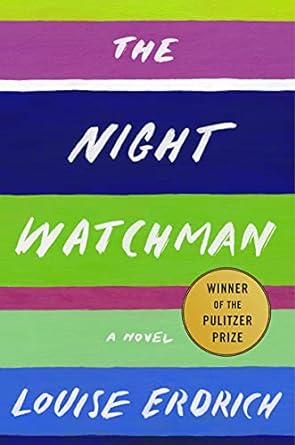
Thomas Wazhashk is the night watchman at the jewel bearing plant, the first factory located near the Turtle Mountain Reservation in rural North Dakota. He is also a Chippewa Council member who is trying to understand the consequences of a new “emancipation” bill on its way to the floor of the United States Congress. It is 1953 and he and the other council members know the bill isn’t about freedom; Congress is fed up with Indians. The bill is a “termination” that threatens the rights of Native Americans to their land and their very identity. How can the government abandon treaties made in good faith with Native Americans “for as long as the grasses shall grow, and the rivers run”?
Since graduating high school, Pixie Paranteau has insisted that everyone call her Patrice. Unlike most of the girls on the reservation, Patrice, the class valedictorian, has no desire to wear herself down with a husband and kids. She makes jewel bearings at the plant, a job that barely pays her enough to support her mother and brother. Patrice’s shameful alcoholic father returns home sporadically to terrorize his wife and children and bully her for money. But Patrice needs every penny to follow her beloved older sister, Vera, who moved to the big city of Minneapolis. Vera may have disappeared; she hasn’t been in touch in months, and is rumored to have had a baby. Determined to find Vera and her child, Patrice makes a fateful trip to Minnesota that introduces her to unexpected forms of exploitation and violence, and endangers her life.
Thomas and Patrice live in this impoverished reservation community along with young Chippewa boxer Wood Mountain and his mother Juggie Blue, her niece and Patrice’s best friend Valentine, and Stack Barnes, the white high school math teacher and boxing coach who is hopelessly in love with Patrice.
The Sentence (2021) / Discussion Questions
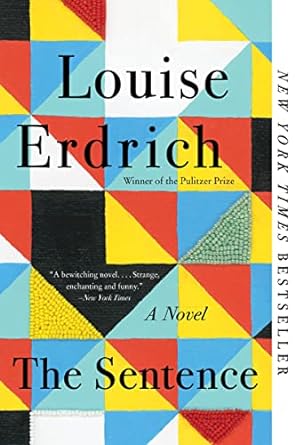
The Sentence asks what we owe to the living, the dead, to the reader and to the book. A small independent bookstore in Minneapolis is haunted from November 2019 to November 2020 by the store’s most annoying customer. Flora dies on All Souls’ Day, but she simply won’t leave the store. Tookie, who has landed a job selling books after years of incarceration that she survived by reading “with murderous attention,” must solve the mystery of this haunting while at the same time trying to understand all that occurs in Minneapolis during a year of grief, astonishment, isolation, and furious reckoning.
A Few Notable Facts
- Erdrich is part of a literary family. She was married to the late Michael Dorris, an anthropologist and writer, with whom she collaborated on several literary projects. She also has several siblings who are writers, including Lise Erdrich, Heid E. Erdrich, and Basil H. Johnston.
- Erdrich co-owns Birchbark Books, an independent bookstore located in Minneapolis, Minnesota. The bookstore specializes in Native American literature, indigenous arts, and literature from around the world. It serves as a cultural hub for the community and promotes diverse voices in literature.
- Erdrich attended Dartmouth College, where she majored in English. She later pursued graduate studies in creative writing at Johns Hopkins University and earned a Master of Fine Arts degree from the University of Iowa Writers’ Workshop.
- Erdrich is a prolific author with a diverse body of work that includes novels, poetry, short stories, and children’s books. She has written over 20 books and has been recognized with numerous awards and honors for her contributions to literature.
- Erdrich is an advocate for Native American rights and social justice. She uses her platform as a writer to raise awareness of issues affecting Indigenous communities, including land rights, environmental justice, and cultural preservation.
- Many of Erdrich’s novels are interconnected and feature multigenerational sagas that span decades or even centuries. Characters from one novel often appear in others, creating a rich and complex tapestry of stories that explore the interconnectedness of lives and communities.
Awards:
- 1975 American Academy of Poets Prize
- 1980 MacDowell Fellowship
- 1983 Pushcart Prize in Poetry
- 1984 National Book Critics Circle Award for Fiction, for Love Medicine
- 1984 Sue Kaufman Prize for Best First Novel, for Love Medicine
- 1984 Virginia McCormick Scully Literary Award for Best Book of 1984 dealing with Indians or Chicanos
- 1985 Los Angeles Times Book Prize
- 1985 Guggenheim Fellowship in Creative Arts
- 1987 O. Henry Award, for the short story “Fleur” (published in Esquire, August 1986)
- 1999 World Fantasy Award, for The Antelope Wife
- 2000 Lifetime Achievement Award from the Native Writers’ Circle of the Americas
- 2005 Associate Poet Laureate of North Dakota
- 2006 Scott O’Dell Award for Historical Fiction, for the children’s book “The Game of Silencez”
- 2007 Honorary Doctorate from the University of North Dakota; refused by Erdrich because of her opposition to the university’s North Dakota Fighting Sioux mascot
- 2009 Honorary Doctorate (Doctor of Letters) from Dartmouth College
- 2009 Kenyon Review Award for Literary Achievement
- 2009 Anisfield-Wolf Book Award, for Plague of Doves
- 2012 National Book Award for Fiction for The Round House
- 2013 Rough Rider Award
- 2013 Scott O’Dell Award for Historical Fiction for Chickadee
- 2014 Dayton Literary Peace Prize, Richard C. Holbrooke Distinguished Achievement Award
- 2014 PEN/Saul Bellow Award for Achievement in American Fiction
- 2015 Library of Congress Prize for American Fiction
- 2016 National Book Critics Circle Award for Fiction, for LaRose
- 2021 Pulitzer Prize for Fiction, for The Night Watchman
- 2022 Berresford Prize for significant contributions to the advancement and care of artists in society
- 2023 Prix Femina étranger for The Sentence (its French translation La Sentence)
See also
- Louise Erdrich Talks Her New Novel, “The Sentence” (Oprah Daily: 11/10/2021)
- Louise Erdrich On Her Personal Connection To Native Peoples’ ‘Fight For Survival’ (NPR: 3/4/2020)
- Louise Erdrich explores mysteries and miracles on the reservation (Indie Bound)
- Conversation: Louise Erdrich, Author of ‘The Round House’ (PBS: 10/19/2012)
- Interview with Louise Erdrich | Arts & Culture (Smithsonian Magazine: 7/31/2006)
Sources
Book club sets are circulated to participating libraries via the CLiC courier. Read all about the program on the Book Club Resource landing page. If you are interested in receiving book club sets but are not already a member library, use the online form to get signed up.
Since the BCR has always relied on book donations, we are deeply grateful to all of the institutions and individuals that have donated sets and helped make the collection stronger. Please contact bookclub@coloradovirtuallibrary.org for questions or to discuss donations.
- Book Club Author Suggestion: Fredrik Backman - December 11, 2024
- Accessibility Quick Tip: Communicating Your Accessibility Efforts - December 3, 2024
- Accessibility Quick Tip: 10 Essential Aspects for an Accessible User Experience - November 19, 2024